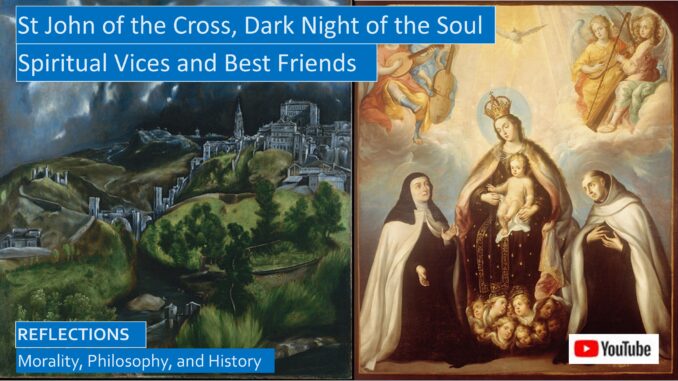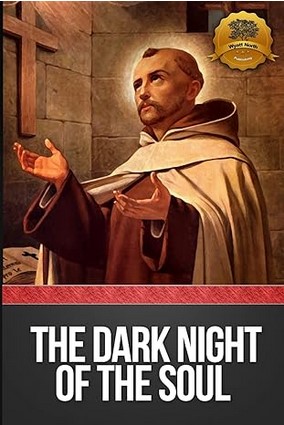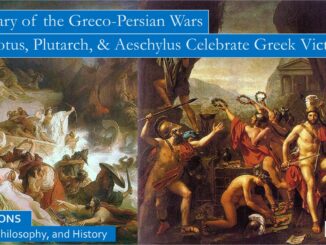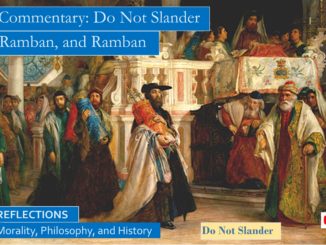
Before you can truly deepen your interior life of prayer and communion with God, you must first purify your soul by combating your spiritual capital vices, strengthening your inner virtues, which are revealed by how you think of your neighbor, what you say about your neighbor, how you act towards your neighbor, and how eagerly you seek to forgive and overlook the shortcomings of your neighbor.

YouTube video for Pseudo-Dionysius the Areopagite: https://youtu.be/wlr55ddb-lc
Video for this blog: https://youtu.be/DgL7Y5pIFAU
Video for St John of the Cross, Dark Night of the Soul, and Dionysius and Mystical Theology: https://youtu.be/6VffPIzfT-o
Video script with more books links: https://www.slideshare.net/BruceStrom1/st-john-of-the-cross-dark-night-of-the-soul-seven-capital-sins-and-best-type-of-close-friend
St John of the Cross is a Doctor of the Catholic Church in the sixteenth century. Early in his priesthood he met St Teresa of Avila, who was a Carmelite nun, and he adopted her program of ascetic discipline and stricter fasting, seeking to rejuvenate the monastic spiritual life. He followed St Teresa, she founded a new convent, he founded a monastery, and he became the spiritual director for her community, according to required practice.
There was a great deal of tension among the Spanish Carmelite friars and nuns rebelling against these strict practices. St John was actually imprisoned by rebellious months, living under a brutal regime that included whippings, little food, and a cramped cell, until he escaped eight months later, it took several months for St Teresa and the hospital to nurse him back to health. Eventually they received papal permission to found a new stricter order of Discalced Carmelites.
Who is the intended audience of the Dark Night of the Soul? Monks and nuns, St John of the Cross wrote Dark Night of the Soul to provide his experience as a spiritual director guiding the prayer life of his monks so their prayers would be genuine. We must first recognize that since “all have sinned and fallen short of the glory of God,” that means that WE must get back to the basics spiritually, confessing our sins each week.
When we, as laymen, study these monastic guides, we must allegorize how to apply this advice to our daily lives, since our daily lives and struggles differ from the monastics, in part because monks do not marry or have children, or have formal secular jobs. Also, we must realize that monasteries were most at the center of ancient and medieval culture than they are in the modern world.
Why would these monks imprison St John? It is misleading to compare modern monasteries to medieval monasteries, in modern times monasteries and convents are few and scattered, in medieval times they were large and numerous. Most young men today who are not sure what they want to do with their life, and do not wish to attend college, sign up for military service. Young men in medieval Europe did not have this option, there were no large standing armies where you could learn life and career skills, so monasteries were the choice for young men who felt they had few other options. Also, young women also found greater independence and opportunities unavailable to other medieval women as nuns. More women were widows in medieval times, convents meant they were not forced to remarry to survive.
Which meant that, indeed, monasteries were a type of spiritual boot camp for these young men, who needed far more remedial spiritual training than the often college-educated spiritual men who seek to enter the monasteries of today.
In the medieval society there were three classes in society, those who fought, the kings and nobles; those who worked, the peasants and serfs; and those who prayed, the monks and nuns. Monks spent much of the day and night praying:
Matins (during the night, at about 2 a.m.); also called Vigil and perhaps composed of two or three Nocturns
Lauds or Dawn Prayer (at dawn, about 5 a.m., but earlier in summer, later in winter)
Prime or Early Morning Prayer (First Hour = approximately 6 a.m.)
Terce or Mid-Morning Prayer (Third Hour = approximately 9 a.m.)
Sext or Midday Prayer (Sixth Hour = approximately 12 noon)
None or Mid-Afternoon Prayer (Ninth Hour = approximately 3 p.m.)
Vespers or Evening Prayer (“at the lighting of the lamps”, about 6 p.m.)
Compline or Night Prayer (before retiring, about 7 p.m.)[1]
To compare medieval monasteries to modern monasteries, first count on one hand how many monasteries nearby, and then imagine what life would be like if there were a hundred times more monasteries, nearly as numerous as schools and hospitals and hotels. To imagine this, you would need to realize that, in medieval times, if you wanted to get an education, or if you were sick and needed a doctor, or if you were traveling and wanted a clean, quiet, safe room, or if you needed a retirement home, you would knock on the door of a monastery. Most universities were affiliated with religious orders, most teachers were either priest or monks.
In the medieval monasteries there was often competition about who prayed the best and who prayed the most, and many monks prayed for extended periods between the hours. St John of the Cross warns us how even this dedication to a life of prayer can lead to envy and pride and thus lead the unwary monk down the path of imperfection if not sin.
The first book talks how easy it is fall victim to list of vices, the capital sins, even when you think you are living a life of prayer, this can easily be adapted to be useful for the layman. Even if we cannot lead a life of pray like a monk is able to do, even if do not prayer deeply seeking to experience the blinding spiritual light of the beatific vision, which very monks truly experience, and St Thomas Aquinas only experienced at the end of his life, we can simply interpret the most obvious lesson that St John of the Cross implicitly gives to all Christians, laymen included, that we should pray more.
Saint John Climacus, who wrote a similar guide for monks, The Ladder of Divine Ascent, gives advice to laymen who wish to adopt the solitary monastic life as best they can in their daily lives: “Some people living carelessly in the world have asked me: ‘We have wives and are beset with social cares. How can we live the solitary life?’ My reply to them is” ‘Do all the good you can; do not speak evil of anyone; do not steal from anyone; do not lie to anyone; do not be arrogant to anyone; do not hate anyone; do not be absent from the divine services; be compassionate to the needy; do not offend anyone; do not wreck another man’s domestic happiness; and be content with what your own wives can give you. If you behave in this way, you will not be far from the Kingdom of Heaven.”[2]
When St John the Cross discusses the inner life of prayer, he is constantly quoting from the Psalms. We modern Christians are spiritually lazy, we prefer to prayer the Vineyard slogans and memes, the catchy phrases, the dumbed-down prayers on PowerPoint slides, we do not want to the work to pray and understand the Psalms, we do not have the patience to concentrate and meditate on the longer Psalms that can sometimes cover several pages in our Bible.
If we want to adopt a deeper prayer life, praying the Psalms is an excellent first step. In the desert monasteries of the ancient world all monks had to read the psalter, and if they were illiterate, they were required to learn how to read so they could read the Psalter. In Benedictine monasteries in particular, the Psalms were read, one after the other, and replaced idle conversation during the midday meal. If ancient monks had to learn how to read to read the Psalter, then it would be a simple task for the modern Christian to learn the patience to read the Psalter.
Modern technology enables modern Christian to live somewhat as the Benedictines lived, we can play a succession of MP3 files of the Psalms during our day. And we set our alarm song on our cellphone to a Rosary MP3 file. But modern technology can also cripple our spiritual life if we spend much of the day watching television or video streaming services.
The Dark Night of the Soul also quotes quite often Job’s prayers in the Book of Job. Job played the role of both a layman and a monk, and the Book of Job tells us the story of his Dark Night of the Soul, which is both a story of a material dark night as a layman who lost all his possessions and children in a fortnight, and as a story of a spiritual dark night as Job wrestled with God, but never cursing God, seeking the true face of God in a world of injustice.
The Dark Night of the Soul is also very similar to the Song of Songs, a story of the deep love between the lover and her beloved, an allegory of the deep love between the praying Christian and the God he loves. St John of the Cross also wrote a short canticle on the Song of Songs:
https://www.poemhunter.com/poem/the-spiritual-canticle/
CAPITAL SIN OF PRIDE
First, we must overcome the bad habits which arise from the capital sin of pride, a pride that comes to us “through our imperfections, a certain kind of secret pride, where we are satisfied with our works and with ourselves,” where we seek to “speak of spiritual things” in the earshot of others, seeking to be teachers rather than learners, acting like the Pharisee, “praising God for our own good works and despising the Publican.” Of course, we always see that our brother is the Publican, as we can never be the Pharisee.
Most laymen, out of practicality, do not have a spiritual director to closely monitor the extent of their daily devotions, and indeed it may not be healthy to have a spiritual director giving such advice blindly to laymen. Abbots or monastic spiritual directors are aware of the daily spiritual struggles of the brothers in their care, they have a feel for the rhythms of their inner life, something that is impossible to monitor for laymen living in the world. But in the spirit of this teaching, laymen should seek to develop a relationship with a confessor who can more effectively guide them in their spiritual life. We should also choose our priest and confessor with care, so we would be sufficiently trusting in their spiritual direct that we would follow the advice they offer when we consult with them any the major life decisions we may be facing, even when their advice we may find hard to follow.
The devil seeks to increase the fervor of those whose spirituality is for show to impress their brother, for the devil knows that without pure motives that “these works and virtues which they perform are not only worthless, but they can also even become vices.” St John of the Cross that people who are so deceived sometimes seek to deceive their spiritual director, not confessing their real sins, but rather confessing sins that do not seem so bad, or sometimes even confessing their real sins to another confessor so they can make themselves look good to their spiritual director. These unfortunate souls “dislike praising others and love to be praised themselves; sometimes they seek out such praise. They are like the foolish virgins, who, when their lamps could not be lit, sought oil from others.”
Those who seek God with a pure heart and genuine humility are not as susceptible to the deceptions of the Deceiver and more quickly progress to perfection with humility, “having little satisfaction with their own progress, considering all others as far better, usually having a holy envy of them, with an eagerness to serve God as they do.” “They rejoice when others are praised; they grieve only because they do not serve God with the same fervor.” “These souls will give their heart’s blood to anyone who serves God.”[3]
CAPITAL SIN OF AVARICE
Although the novice has vowed to follow a life of poverty, giving up all his possessions, he is still subject to the capital sin of avarice. Many seek to accumulate religious trinkets, crosses, images and rosaries that they become attached to. St John of the Cross teaches us, “Many can never have enough of listening to counsels and learning spiritual precepts, reading many spiritual books, and they spend time on all these things rather than on works of mortification and the perfecting of the inward poverty of spirit which should be theirs.”[4]
How can I defend myself against this accusation from St John of the Cross? Certainly, it is better to read spiritual books than watch television and videos. This is yet another reminder simply that we should pray more and pray that our spiritual readings will truly improve our soul.
CAPITAL SIN OF LUXURY
My most vivid memory of the teachings of St John of the Cross when I first read it many years ago was his teachings on who you should permit to be your closest friends. This is found in his teachings on how the spiritual life can be hindered by the capital sin of luxury. These spiritual luxuries are those sensual delights and remembrances that hinder our prayer life and our spiritual life. These include the sensual thoughts that creep into our minds to distract us when we attempt to pray deeply to our God in earnestness.
What does St John of the Cross mean when says that sometimes the “pleasure which human nature takes in spiritual things” can be a spiritual luxury hindering our spiritual growth?
By analogy, when we fall in love, when we seek to marry, do we seek someone who will make us happy? But if our marriage is both happy and successful, each spouse must first seek to be kind to the other, each putting the other’s needs first, each seeing the marriage as a monastic calling.
Does St John of the Cross teach us that the same is true in our spiritual lives, that our spiritual life will be like seed sown among the thorns if we only pray to God to solve our problems and ensure our success? Or that our spiritual life will be shallow if we pray to God that we be happy and content and not be tested, so we can enjoy the “pleasure which human nature takes in spiritual things?”
We need to choose our close friends with care, lest they be a spiritual luxury that clouds our soul and hinders our spiritual life. “When our friendship is purely spiritual, the Love of God grows with it; and the more the soul remembers it, the more it remembers the Love of God, and the greater the desire it has for God.” But a sensual friendship decreases in us our Love of God and obstructs our spiritual progress. “If that sensual love grows, the soul’s love of God will grow colder, and will forget God as it remembers the sensual love.”[5]
When we draw an analogy to our lives as laymen, and specifically to our lives of love and marriage, we should only welcome the love that is both sensual and spiritual, we should only welcome this only if our love for our spouse increases in our heart our Love for God. We need to ask ourselves: Do we bring out the best in each other? Or, do we bring out the worst in each other? Our marriage is a monastic calling, our marriage should be for our children. The prospective bride should ask herself the key question, Will he be a good father? Will he be good with our children?
There are many unhappy marriages in the Old Testament, and many less than perfect though somewhat happy marriages, but we do have one example of a marriage that is truly happy according to earthly standards, but this was a marriage that ended in tragedy and death, a marriage that was cursed by God because their love for each other did not increase in them their Love of God. This was the marriage between King Ahab and Queen Jezebel, we can infer they were truly in love as theirs was one of the few royal monogamous marriages in the Old Testament, and we read she showed genuine concern for his troubles.
One day Ahab “lay down on his bed, turned away his face, and would not eat.” His wife Jezebel came to him and said, “Why are you so depressed that you will not eat?” He said to her, “Because I spoke to Naboth the Jezreelite and said to him, ‘Give me your vineyard for money; or else, if you prefer, I will give you another vineyard for it’; but he answered, ‘I will not give you my vineyard.’” His wife Jezebel said to him, “Do you now govern Israel? Get up, eat some food, and be cheerful; I will give you the vineyard of Naboth the Jezreelite.”
Then the evil Jezebel then framed Naboth on a false charge of blasphemy and had him stoned to death so her Ahab would be happy once more. The Lord instructs Elijah to proclaim a curse on Ahab: “In the place where dogs licked up the blood of Naboth, dogs will also lick up your blood.” Concerning his doting wife, “the dogs shall eat Jezebel within the bounds of Jezreel.”[6]
Many years later, after Jehu overthrew King Joram, son of Ahab, with Elijah’s blessing and urging, he marched into Jezreel. We read in 2 Kings that when the deliciously wicked Jezebel heard Jehu was coming, “Jezebel heard of it; she painted her eyes, and adorned her head, and looked out of the window” of her palace, taunting Jehu. Jehu yelled up to the eunuchs, and they showed their loyalty to him by throwing Jezebel out the window. “Some of her blood spattered on the wall and on the horses, which trampled on her. Then Jehu went in and ate and drank; he said, ‘See to that cursed woman and bury her; for she is a king’s daughter.’ But when they went to bury her, they found no more of her than the skull and the feet and the palms of her hands.”[7] These may have been the vicious wild dogs that today only live in Africa; their range was likely more widespread in the ancient world.
Ahab also met an early death, but Ahab’s curse was realized nobly, twice removed. From a perspective of a pagan warrior culture, the Lord permitted him to die the noble death of a warrior, since he died in battle gaining kleos, or glory, gaining a pagan immortality of sorts as they would be remembered in stories retold by their ancestors, as we explored in our videos and blogs on the warrior culture of the Iliad. Ahab died from a spear thrown at him in the thick of battle, he died standing, his blood flowing onto the floor of his chariot. The dogs did not touch his body, but rather when his blood was washed from his chariot, the dogs licked up this water mixed with his noble blood. Maybe his divine curse was mixed with a divine pity that he married such an evil woman who ruined his formerly noble soul.
We told the story of Ahab and Jezebel because it is such a vivid example of how we can use Scripture to allegorize the teachings of St John of the Cross on how we should carefully select our best friends to our lives as laymen. Nowhere does St John of the Cross discuss the trials we face in marriage, because his intended audience of monks never face the trials of marriage. But his teachings on how we should select our best friends carefully can certainly be applied to how we should select our husband or wife carefully, how we should select a spouse who will increase in us our Love for God and love for our neighbor, a spouse who will encourage us to walk on the narrow path, a spouse who will bring out the best in us, and will not bring out the worst in us. This is because of all the marriages in the Old Testament, from a worldly perspective, this is the happiest marriage. Which other Old Testament wife so actively seeks to please her husband? But Jezebel brings out the worst in Ahab, who Elijah praises for his repentance, so that in the end he shares with her a similar curse, that the dogs will lick his blood.
CAPITAL SIN OF WRATH
St John of the Cross teaches us that the capital sin of wrath “happens when we become irritated at the sins of others, and keep watch on them with uneasy zeal,” this tempts us to see the faults of others but ignore our own faults. We see this in an early story of two brothers who lived a monastic existence with few possessions, who lived their lives solely for the favor the Lord showed them for their offerings. [8] Cain was angry when the Lord showed no favor for his offering, and in response to his anger and impatience the Lord asked Cain, “Why are you angry, and why has your countenance fallen? If you do well, will you not be accepted? And if you do not do well, sin is lurking at the door; its desire is for you, but you must master it.”[9]
CAPITAL SIN OF SPIRITUAL GLUTTONY
St John of the Cross teaches the novice to be wary of the capital sin of spiritual gluttony. In a monastery each monk is assigned a spiritual director who directs him in his penitential and spiritual exercises, his prayer life, so it is sufficient but not excessive. But many monks, “lured by the sweetness and pleasure which they find in such spiritual exercises, strive more after spiritual sweetness than after spiritual purity and discretion.” The spiritual gluttony of some “continually go to extremes,” ignoring moderation, “killing themselves with penances, weakening themselves with fasts, performing more than their frailty can bear, without the order or advice” of their spiritual director.
St John of the Cross warns us that we should not strive with great effort for “prayer that consists of only experiencing sensible pleasures and devotion,” that we should not “think that we have accomplished nothing, lest we lose true devotion and spirituality, which can be gained only with perseverance, patience, and humility,” seeking only to please God.[10]
We can allegorize these teachings so they apply to us laymen. Don’t we often pray to God with a list of requests, to spare us from life’s trials and tribulations, to spare us and our family from suffering and death? How often have we heard that those who suffer from life’s tribulations, how they often become angry when they think God is ignoring their prayers and requests. Then they wonder if there really is a God since he is so obviously ignoring them. May we should instead realize that prayer is its own reward. The best prayer we can pray in times of troubles and tribulations to pray the strength to endure our trials and temptations, that we may live a godly life, and that today we may live a life without sin.
We even have a word for this belief: Theodicy, or why does God permit bad things to happen to good people? This term tells us more about ourselves than it tells us about God, the very term itself implies that we are more concerned about our own well-being, and how God should take care of us, than how we should always, regardless of our circumstances, seek to love our neighbor as ourselves, and Love our God.
CAPITAL SINS OF SPIRITUAL ENVY AND SLOTH
St John of the Cross warns us against the bad habit of the last in the list of capital sins, spiritual envy and sloth. Envy is the gateway sin of impure thoughts that leads to all other mortal sins like anger, murder, theft, and adultery. When we fall to the sin of spiritual envy, “we prefer not to hear others praised, we become displeased at other’s virtues” and sometimes beat down their praises, “contrary to the spirit of charity, which, as St Paul states, rejoices in goodness. And, if charity has any envy, it is a holy envy, grieving us when we do not have the virtue of others, but also see joy in the virtue of others, and we delight when others surpass us in the service of God.”
Spiritual sloth and envy endanger our love for our neighbor, and any spiritual exercise that does not increase in us our love for our neighbor is futile, misdirected, and is a waste of time.
St John of the Cross teaches us that we are guilty of spiritual sloth when we “fail to find in prayer the satisfaction which our taste requires,” when we abandon prayer and the “way of perfection, seeking instead the pleasure and sweetness of our own will. We pray rather that we persist in prayer without making any demands of God, not demanding that any sweet feelings flow during prayer. St John of the Cross warns us that we should not “find it irksome when we are commanded to do that which gives us no pleasure,” rather, “we should have the fortitude to bear the trials of perfection.” We should not be like those “who are softly nurtured and who run fretfully away from everything that is hard, and take offense at the Cross, in which they can find the delights of the spirit.”[11]
Anywhere there are large communities, like the medieval monasteries, there is also peer pressure. The concept of monasteries is that the peer pressure would be more beneficial than out in the cold, sinful world. The monastic handbooks warn us that demonic forces seek to twist even this benign peer pressure into malignity, into a bad thing. An excellent description of this hidden warfare is the work by CS Lewis depicting how demons seek to drag down the faithful in his Screwtape Letters. This is also a predominant theme in Dark Night of the Soul.
These observations by St John the Cross in Dark Night of the Soul contains a great spiritual truth and perhaps a glimpse into the history of the times:
When the soul who has only begun its spiritual journey, it “finds delight in spending long periods, sometimes whole nights, in prayer; penances are its pleasures; fasts its joys; and its consolations are to make use of the sacraments and to occupy itself in Divine things. In these Divine things spiritual persons often find themselves, spiritually speaking, very weak and imperfect. For since they are moved to these Divine things and spiritual exercises by the consolation and pleasure that they find in them, and since, too, they have not been prepared for them by the practice of earnest striving in the virtues, they have many faults and imperfections” in their spiritual life.
Put simply, you can pray all night, you can burn candles all day, you can fast all week, make a show of being all sad and penitential, but if you don’t show kindness and love to your neighbor all your spiritual efforts; if you don’t love your neighbor, then you don’t Love God, which others have put simply and elegantly:
https://www.youtube.com/watch?v=epArSqlMQ-E
[1] https://en.wikipedia.org/wiki/Liturgy_of_the_Hours
[2] St John Climacus, Ladder of Divine Ascent, (Boston: Holy Transfiguration Monastery, 1991, originally written 1100’s, translated by Colm Luibheid and Norman Russell), Step 1, p. 9.
[3] St John of the Cross, Dark Night of the Soul (New York: Doubleday, 1990, 1959, originally 1579, translator, E Allison Peers), Book 1, Chapter 2, pp.39-44.
[4] St John of the Cross, Dark Night of the Soul, Book 1, Chapter 3, pp.44-45.
[5] St John of the Cross, Dark Night of the Soul, Book 1, Chapter 4, pp.47-52.
[6] https://www.biblegateway.com/passage/?search=I+Kings+21&version=NRSVCE
[7] https://www.biblegateway.com/passage/?search=2+Kings+9%3A30-37&version=NRSVCE
[8] St John of the Cross, Dark Night of the Soul, Book 1, Chapter 5, pp.52-53.
[9] https://www.biblegateway.com/passage/?search=genesis+4%3A6-7&version=NRSVCE
[10] St John of the Cross, Dark Night of the Soul, Book 1, Chapter 6, pp.53-58.
[11] St John of the Cross, Dark Night of the Soul, Book 1, Chapter 7, pp.58-60.




Be the first to comment